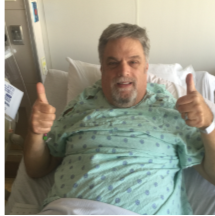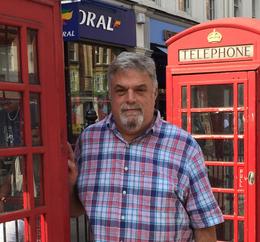I have had HIV disease since the mid-1990’s. With quarterly doctor visits, lab work, and combination HIV drug therapy, I’ve had no opportunistic infections; my CD4 count is good and viral load undetectable.
However, I have had high blood pressure and been on a low dose BP medication for a more than a decade. In 2012, after my physician noticed some abnormal labs, he referred me to a nephrologist who diagnosed Stage 2 kidney disease. He advised me to lose weight, reduce my sodium intake and prescribed additional medications. There didn’t seem to be a sense of urgency; he said that the disease could take many years to progress. He believed the causes were high blood pressure and possibly inherited predisposition. (My mother also had high blood pressure and eventual kidney failure.)
I tried to reduce the sodium in my diet and to lose weight, with marginal results. Medications were frequently changedto no avail. My GFR continued to worsen.
In the spring of 2014, I changed jobs, insurance, and doctors and my new nephrologist told me that I was now in Stage 3. Two months later I wound up in the ER with a TIA (mini-stroke). While a TIA was never confirmed, my nephrologist was called in and advised that I had ESRD and that I must prepare to go on dialysis. After an orientation class where a doctor discussed the different dialysis options, I elected to go on Peritoneal Dialysis (PD). With PD I would be able to maintain a somewhat normal life and continue working and traveling. I also thought it would be physically easier on my body and a good entry point to dialysis. I remembered that my mother had a difficult life on hemodialysis, and it took almost a full day for her to recover. Her diet and fluid intake were very restricted, and I did not want that for myself.
I was placed on a very strict renal diet, and PD catheter surgery was scheduled. After surgery and a five-week recovery and training period, I started PD. My pre-dialysis diet eased, and I could now have some red meats and small amounts of the high potassium foods that we all love to eat (potatoes, tomatoes, and beans). Dairy was still off limits, but because I still had some kidney function and my urine output was good, I did not have to be so concerned with limiting my fluid intake.
The challenging aspect of PD was establishing my routine and maintaining compliance, the diet or the medications. For example, PD takes about 8 hours to complete every night, so you need to be very aware of the clock. My workday started at 7:30 am so I had to hook up to the overnight cycler machine at about 8:30 pm.
In September 2014 I had my evaluation for a kidney transplant at UCSF and was put on their waiting list. At that time, they had over 5000 on the list and the average wait time was between 5 and 7years.
I joined the Bay Area Association of Kidney Patients (BAAKP) attending their support group meetings and educational seminars. In May 2015 there was a presentation about kidney transplantation; the presenter showed all of the transplant centers in Northern California and their statistics. UC Davis is in a different OPO (Organ Procurement Organization) network than UCSF and performed a similar number of transplants per year, but the UC Davis waiting list was significantly shorter. I decided to apply to be on their list too and increase my odds of getting a transplant.
During my next dialysis clinic visit, I asked my doctor about also referring me to UC Davis. He stated I could not apply because they did not accept HIV patients. Devastated and a little skeptical because I knew HIV patients were getting transplants elsewhere, I decided to inquire. I called the next morning and was told that yes, they did accept HIV patients, and since I had already been accepted by UCSF, I could use many of the same test results, but I would pay for the evaluation and any additional testing. At the cost ofaround $1000, I felt it was well worth the price if I could get my transplant faster.
I called my Dialysis Renal Case Manager and asked for a referral to Davis. She was surprised at the news but would get started. During my next appointment at the dialysis clinic, my doctor was very apologetic about having the wrong information and pledged that the team would help in any way they could.
I applied to UC Davis, completed their labs, met with the transplant team and waited for the acceptance letter. I called them every two weeks to check in.

Greg After Transplant
On February 26th at 9:00 am I got a call at work from a Transplant Coordinator from UC Davis saying they thought they might have a match for me and was I available. YES! I was in shock. I had still never been officially approved, and now they are calling! How could this be? I did not hear from them the rest of the day. When I got home that afternoon, the acceptance letter was waiting in my mailbox. The letter was dated Feb 12th and stated that I was officially on their transplant list. I felt like I had won the kidney Lottery! I had been on the UC Davis list for only two weeks. I knew of people in my BAAKP Support Group, who have been waiting for years. I kept asking myself, “Why me?” That question remains to be answered.
By 5:00 pm, I called, and they were still waiting on word about the donor’s kidney. At 11:45 pm I received “the call.” I was to report to the hospital in Sacramento, 2 hours away, at 7 am. I did not get much sleep that night!
At the hospital the next day, there were more tests to confirm that I was still suitable and also that the donor’s kidney was of high quality. Final go-ahead was givenat 4:30 pm and I was in surgery by 5:00 pm. The surgery lasted 5 hours, andeverything went well. With some deceased donor kidneys, it can take a while to start working. Mine acted more like a live donor organ and started up immediately. The staff was elated by my daily labs and recovery, and I was sent home the fourth day after surgery.
After three months of recovery at home, I am now back at work full time. There is still much hard work ahead. Compliance is even more important now, but I feel I have been preparing for this moment for the last twenty years. With much support from family and friends, I am the luckiest guy in the world!
Here is my take away to have a successful CKD journey:
Compliance is crucial. Be compliant in your dialysis schedule and routines. Stick to your diet and nutrition goals and monitor your labs carefully and make adjustments as necessary.
You must advocate for yourself. Be an active participant. Only you know what works best for you.
Knowledge = Life. Do your research, educate yourself and always ask lots of questions. Talk to your nurses; they are always a great resource. Consult with members of BAAKP (www.baakp.org).
Yes, you can have HIV and get a transplant!

Greg Mustard
UPDATE: I am approaching 2 1/2 years post-transplant. I feel good and that I am in a great place in my life. I am working full time, planning for my retirement in a few years and working diligently on my travel bucket list. After going through such a life-transforming event, you don’t take anything for granted and try to live life to its fullest. I continue to attend the BAAKP support groups and educational seminars. I want to be able to share my knowledge and experiences with others as so many did with me. The support from BAAKP and the members make it seem like you are not alone and that we go through this journey together.
